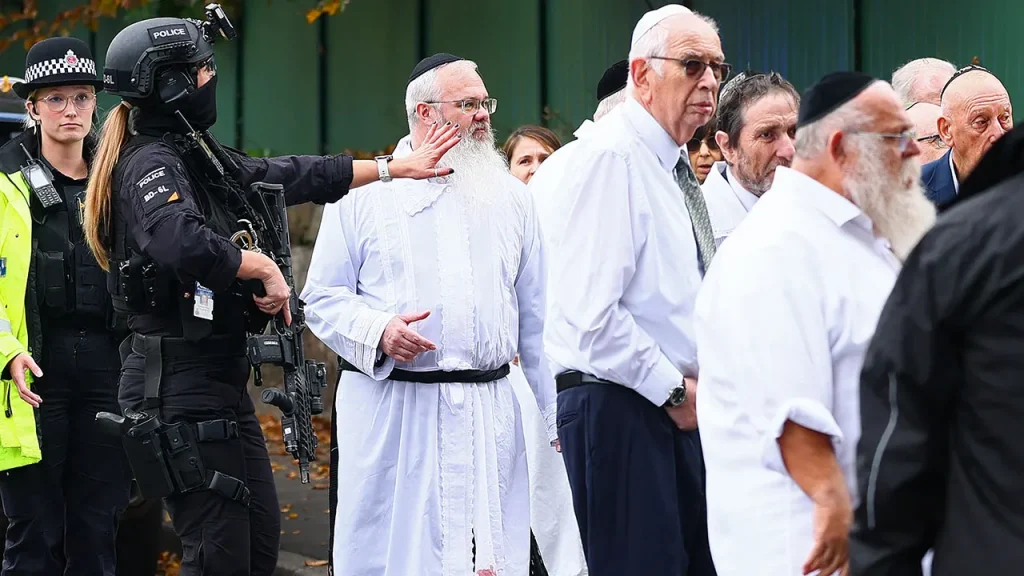Rising Antisemitism: A Global Crisis After Manchester Attack
In a tragic reminder of the persistent threat of antisemitism, at least two people were killed in an attack outside a synagogue in Manchester, United Kingdom on Thursday. The violence occurred as millions of Jews observed Yom Kippur, the holiest day in their faith, and amid ongoing efforts to free 46 Israeli hostages still held by Hamas. The attacker targeted the Heaton Park Hebrew Congregation by ramming his car into pedestrians before stabbing at least one person. British police shot and killed the suspect, with authorities declaring the incident an act of terrorism. “Attacks like the one today in the U.K. sadly are becoming normalized,” observed Jonathan Ruhe, Director of Foreign Policy at the Jewish Institute for National Security of America, in comments to Fox News Digital.
The Community Security Trust (CST), which monitors antisemitic attacks in the U.K., reported a dramatic surge in incidents following the October 7, 2023, Hamas attacks on Israel. The organization recorded 4,103 antisemitic events across Britain in 2023—an all-time high. October 2023 alone saw 1,330 reported instances of antisemitism, including assaults, property damage, threats, and abusive behavior directed at Jews. November and December that year followed with 931 and 477 incidents respectively, making them the second and fourth worst months for antisemitism in British history according to the CST’s records. Last year’s total of 3,528 incidents more than doubled the 1,652 incidents reported in the year before the October 7 attacks. The CST’s analysis linked this surge directly to ideologically or politically motivated sentiments related to the ongoing conflict in Gaza.
Israeli Prime Minister Benjamin Netanyahu expressed his condolences for the victims of the Manchester attack, stating, “Israel grieves with the Jewish community in the UK after the barbaric terror attack.” He added, “As I warned at the UN: weakness in the face of terrorism only brings more terrorism. Only strength and unity can defeat it.” While the specific motive behind the Manchester attack remains under investigation, Ruhe suggested that European leaders’ failure to use “their diplomatic weight to support a viable post-Hamas future for Gazans” while choosing to “punish” Israel has contributed to rising antisemitic sentiment. The attack occurred just two weeks after the U.K. and other European nations agreed to recognize a Palestinian state after long refusing to do so—a move some critics see as potentially emboldening extremists.
The alarming trend of antisemitism extends well beyond the United Kingdom. In the United States, the situation may be even more concerning given the country’s different historical relationship with combating the issue. While Jewish-targeted attacks in the U.K. rose by 282% over the past decade according to CST data, antisemitic incidents in the U.S. skyrocketed by an astonishing 893% during the same ten-year period, based on Anti-Defamation League statistics. American authorities documented 9,354 incidents last year alone. “The rise of open and violent antisemitism in America is more recent than in much of Europe, but perhaps all the more worrying because of that,” Ruhe noted. He pointed specifically to college campuses as flashpoints, arguing that universities need to take stronger action against protests that “intend only to intimidate Jews and anyone who calls for policies short of ending Israel’s existence.”
Ruhe emphasized that antisemitism transcends traditional political boundaries, manifesting in troubling ways across both ends of the ideological spectrum. On the far left, campus demonstrations have sometimes employed militarized language and tactics that many Jewish students find threatening. Meanwhile, on the far right, influencers have attempted to recontextualize discussions about Hitler and Nazism in ways that minimize their historical atrocities. “There needs to be more serious and clear pushback from our political leaders on narratives like these,” Ruhe stressed, highlighting the need for a unified response against all forms of antisemitism regardless of political origin.
The Manchester attack represents more than an isolated incident—it stands as a stark reminder of the resurgent global threat of antisemitism. From Europe to America, Jewish communities are experiencing levels of hostility not seen in decades. While the specific drivers vary by region and political context, the overall trend points to a disturbing normalization of anti-Jewish sentiment. As hostages remain in captivity and tensions continue in the Middle East, addressing this rise in hatred requires not just condemnation of individual acts of violence, but a comprehensive approach that challenges antisemitism’s intellectual foundations across the political spectrum. Until political leaders, educational institutions, and civil society organizations unite in this effort, Jewish communities worldwide will continue to face the painful reality that their safety cannot be taken for granted—even on their holiest days.















